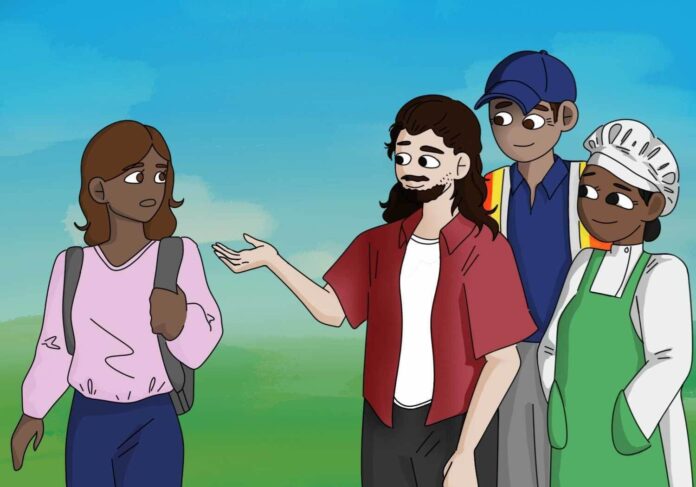When I was young, I had a great deal of trust that I willingly invested into the world. To me, this trust is synonymous with my experience being Latinx, and upon self-reflection, stems from the trust that my mother and father had when immigrating to the United States. My father immigrated in 1990 from Argentina and my mother immigrated in 1976 from El Salvador, both eventually going to college here and starting successful careers. To leave their homes and start anew required that level of trust, a belief that things would work out. When they both decided to settle down in Glendale, California — coincidentally the city my mom first arrived in — I grew up holding onto that trust. However, there are few Latinx people in Glendale, and throughout my entire educational career I’ve always been one of the few Latinx students in my class.
Although this is something I have become accustomed to, I am surprised that in my two and a half years at Oxy, I have only met one other student who is Salvadorean, and one who is Argentinian. While I have not met many other Salvadorean students, I have met other Salvadorean people at Oxy. I have met countless staff at Oxy, who, like me, are Salvadorean. When I lived in Erdman, I became friends with the Salvadorean janitor. At the Marketplace, I say “Hi” in Spanish to many of the chefs and crew who are my friends.
It is strange that so few of my people are at this college in the same capacity that I am. Conversely, I find comfort in the fact that I am understood by the staff at this school. On the other side of the counter at the MP, I see myself.
The more sinister side of this, however, is the division created between me and the rest of the student population. If I relate to the staff more than the students, where does that leave me? Worse, why are all of the workers behind the scenes at Oxy Latinx? Being from LA, I am no stranger to this phenomenon, but it becomes more poignant when juxtaposed with the fact that this is a private, liberal arts institution.
Part of me wonders if the reason that there are so few Latinx students at this school is because the college system is simply not built for us. And the truth is, it isn’t. Culturally, moving away from home to go to college is unthinkable. In Argentina, college is paid for, and you don’t move out of your house until you get married. My family in El Salvador is so poor that even when they get married, they cannot move out. At most colleges, there are few resources for Latinx students — or any people of color.
Part of what I have had to reckon with since coming to Oxy is that at its heart, the “college experience” — something I’ve heavily bought into — is a white experience. While this was no surprise to me entering Oxy, especially hearing my parent’s experiences, what has surprised me is how it has affected me. Since I have come to Oxy, I have felt strangely unanchored, and have struggled with an unprecedented level of anxiety. I wonder if this still would have happened if I went to school with more people that looked like me. College is a difficult experience on its own — adding a racial element makes it nigh unbearable.
To be Latinx in the United States is to inherently live between two worlds. On one hand is the history of your ancestors, and on the other the pressure of the culture of the States. As a second generation student, I am especially forced to juggle the two. Of course, this is nothing new, and speaks to the experience of my parents, as well. Piling on the fact that I have been told by society that education at white schools is the only hope of not repeating the past erodes the line between student and college, creating an estranged, symbiotic relationship full of pain. Suddenly, doing something as simple as walking through the quad is painful as I feel so different.
The truth is that since I have gone to college I have lost the trust in the world that marked my childhood. The trust I so dearly held onto stems from generations of trauma, dating from the war my mother escaped from in El Salvador to colonialism. In bearing witness to the differences between myself and a majority of the student population, the troubled path of my family and my community is illuminated.
When I was young, I saw this juggling as an opportunity. I willingly took on the responsibility of being part of both worlds, as I was so sure that it would be me who would break the generational curse of being present for all that pain. I was to be the ultimate bridge between my family’s long, pained history and our uncertain future. Perhaps that is why, unconsciously, I majored in physics, the study of nature’s ideals, fueled by math — a universal language. But I changed my major, and I changed my view. Rather, I have begun to question why it is me and not my parents. This responsibility that I so eagerly took on has turned into confusion, as I wonder if it shouldn’t have been me to have this opportunity, but someone else.
In essence, I worry that instead of breaking out of the system, I am just one more page in an objectified history. That being said, I do not fear the future, and still believe that change is possible. While there is a lot of pain in the Latinx identity, there is even more strength and resilience.
Contact Sebastian Lechner at slechner@oxy.edu.
![]()































